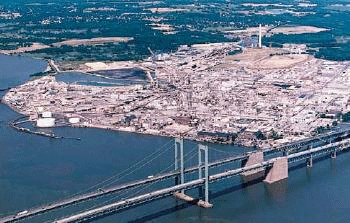Nerve-agent plan dumped
DuPont will not be helping the Army dispose of 4 million gallons of watered-down VX in the Delaware.
By Troy Graham, Inquirer Staff Writer, Posted on Sat, Jan. 06, 2007
Under heavy pressure, DuPont Co. yesterday dropped out of an Army plan to dispose of caustic wastewater from the destruction of the deadly VX nerve agent in South Jersey.
DuPont's decision ends the three-year fight over the plan. Up to four million gallons of treated, watered-down VX would have been shipped by truck or train through four states from a chemical weapons stockpile in Indiana to DuPont's Chambers Works in Deepwater, Salem County. There, it would have been dumped into the Delaware River.
"There will be no VX byproduct dumped in the Delaware River," said U.S. Rep. Robert Andrews (D., N.J.). "This is a real victory for the residents of South Jersey and the health of the Delaware River."
The plan to dispose of the wastewater drew sharp opposition from the public, elected officials and environmentalists. A coalition of environmental groups filed a lawsuit against the Army last year in U.S. District Court, and many of the regulatory issues remained unresolved.
"It's hard to ever know what's the straw that broke the camel's back," said Tracy Carluccio, the deputy director of the Delaware Riverkeeper Network, one of the plaintiffs in the lawsuit. "All of this was working on DuPont and showed them this was really not in their best interest to move forward."
DuPont said the science involved in treating and disposing of the wastewater was sound, and the plan was safe, but the company recognized that many hurdles remained.
"DuPont has had a successful history of working with New Jersey regulators and communities, and we value those relationships," said Nick Fanandakis, a DuPont vice president and general manager. "However, during the three-year evaluation of the... proposal, it has become increasingly clear to us that the approval process will be lengthy and arduous."
The Army approached DuPont shortly after Sept. 11, 2001, when it was ordered to accelerate the disposal of chemical weapon stockpiles that could be targeted in a terrorist attack, said DuPont spokesman Anthony Farina.
In the next three years, DuPont's Chambers Works safely disposed of seven million gallons of wastewater from neutralized mustard gas, he said.
In 2003, the Army proposed a plan to dispose of wastewater from a neutralized VX nerve agent stockpiled at the Newport Chemical Depot in Indiana. That plan sparked outcry from the public and environmentalists.
The company held 90 public meetings, revised its proposal, and had the Centers for Disease Control and Prevention review it. Farina said the company won over many skeptics in the process.
"Even with all that support and the traction from all that, it became clear that the regulatory process would be a long one," he said. "I think there was a lot of misinformation about the Newport proposal initially."
Army officials said they would explore all options for the wastewater. Environmentalists have called for the Army to store the wastewater at Newport, rather than trucking it elsewhere for treatment and disposal.
New Jersey's congressional delegation lined up against the Army's plan to bring the wastewater to Salem County. In 2005, Congress required the Army to submit a cost-benefit analysis of the plan, then have the Government Accountability Office review the analysis.
The GAO is supposed to issue its report this month. Farina said he has heard that the GAO would support the Army's position, and that DuPont's decision to back out of the plan had nothing to do with the forthcoming report.
Environmentalists said they thought the GAO's report would be bad for DuPont.
"If it was going to be good, do you think they would be dropping it?" asked Jeff Tittel, the director of the New Jersey Sierra Club. "We thought the Army had a lot of nerve to dump on New Jersey. We're glad they lost their nerve."
New Jersey's elected officials praised DuPont's decision.
"This is a decisive victory for the people of New Jersey," Gov. Corzine said. "VX nerve agent is one of the world's most deadly chemical compounds and dumping it in a river never made any sense."
Contact staff writer Troy Graham at 856-779-3893 or tgraham@phillynews.com.
New Jersey (Photo courtesy DuPont)

